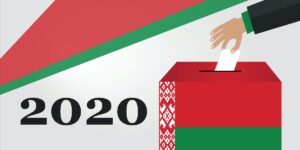Detentions have started at the Independence Square. The entrance to the Red Church is blocked. About 1000 protesters. A lot of police. pic.twitter.com/67fj1ih4B7
— Franak Viačorka (@franakviacorka) August 27, 2020
Russia has assembled a law-enforcement team to help shore up Belarusian leader Alexander Lukashenko if protests against him spiral out of control, President Vladimir Putin said, giving the first indications of how Moscow might intervene to help its longstanding ally, The Wall Street Journal reports:
Mr. Putin said the special unit had been requested by Mr. Lukashenko, who for the past two weeks has been facing massive street protests after claiming an election win that his opponents and the West said was marred by widespread fraud. In an interview on state television, Mr. Putin noted the countries’ close historic and ethnic ties and said Russia was obliged to support Belarus under a collective defense treaty and other agreements to align the two neighbors politically.
Putin is portraying the protests as the work of external actors aiming to subvert Russian interests.
“This is an operation by the Ukrainian special services together with the American ones,” he said. “Now this is reliably known.”
Russian President Vladimir Putin says he could send police to Belarus if the situation “gets out of control” https://t.co/5fu1YmGMAc
— BBC News (World) (@BBCWorld) August 27, 2020
‘Not a geopolitical revolution’
Putin’s threat comes despite the protesters’ insistence that they seek an Armenian scenario – a democratic transition that does not threaten the Kremlin’s strategic interests.

Globsec
“The revolution in Belarus is not a geopolitical revolution,” Belarus opposition leader Svetlana Tikhanovskaya told European parliamentarians on Tuesday. “It is neither a pro-Russian, nor an anti-Russian revolution.”
However uncertain the road ahead, the protests in Belarus show how authoritarianism ultimately subverts itself, writes European Council on Foreign Relations Council member Timothy Garton Ash:
In a review of Anne Applebaum’s very interesting new book, Twilight of Democracy, the political scientist Ivan Krastev admonishes her, and us, not to make the ideals and “self-evident truths” of 1989 the starting point for remaking today’s world. Well, it all depends on what you think was the “self-evident truth” of 1989. If you think it was that history would unfold smoothly and inevitably towards Western-type liberal democracy, then obviously that was and would always be mistaken.
When rightly dissecting the many failings of liberal democracy over the last 30 years, we risk falling into a kind of historical fatalism, he adds. That would be to make the “here’s the direction of history” mistake once again, only in the opposite direction, and to give authoritarian rulers an undeserved and significant psychological advantage. RTWT
Russia cannot afford to lose Belarus “after losing the Baltics and Ukraine,” said George Friedman, the founder and chairman of Geopolitical Futures. On the other hand, if the Russians were to take up positions on Belarus’ western border facing Poland, it would create an intolerable situation for Warsaw and its European and American allies, he told VOA.

FPRI
But Ian Brzezinski, a former deputy assistant secretary of defense for Europe and NATO policy, disagreed, arguing that “the time for buffer states is long gone.” He thinks the momentum for change is there and there is no reason why Belarus cannot succeed in transitioning to democracy as other Eastern European and Baltic states have done.
With the emergence of an independent Belarusian national identity, we are entering a new stage in the collapse of the Soviet Union, adds Franak Viacorka. Events in Belarus remain finely poised, but it is already clear that the country will never be the same again, he writes for the Atlantic Council:
 Ukraine’s national awakening helped generate unprecedented interest in Belarusian culture. In the wake of the Euromaidan Revolution, it became increasingly common to see Belarusians wearing folk-style embroidered fashions. Belarusian language classes began springing up all over the country. Another symbolic moment was the 2019 reburial of nineteenth century Belarusian national hero Kastus Kalinouski {aka Kalinowski} who was among the leaders of the 1863 Uprising against czarist rule.
Ukraine’s national awakening helped generate unprecedented interest in Belarusian culture. In the wake of the Euromaidan Revolution, it became increasingly common to see Belarusians wearing folk-style embroidered fashions. Belarusian language classes began springing up all over the country. Another symbolic moment was the 2019 reburial of nineteenth century Belarusian national hero Kastus Kalinouski {aka Kalinowski} who was among the leaders of the 1863 Uprising against czarist rule.
Belarus is already a nation reborn, according to National Endowment for Democracy President Carl Gershman. Lukashenka and his cronies simply cannot go back to business as usual after this Belarusian summer of solidarity. They thought that by unleashing terror they would stop the protests. They believed fear would paralyze the people. But they were mistaken. They must now concede defeat and exit the stage. There must be new elections, free and democratic, he writes. RTWT
Belarusians are making the world pay attention. How will the West respond? @USRepKeating, @RepKinzinger, @franakviacorka, @mikercarpenter, David J. Kramer, @BelFreeTheatre, & @JohnEdHerbst break down how the West can support Belarus.
— Eurasia Center (@ACEurasia) August 26, 2020







